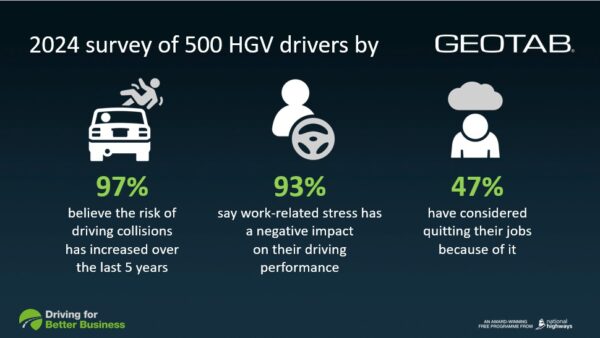Managing Driver Mental Health: A Roadmap for Employers.
In today’s fast-paced world, the importance of mental health cannot be overstated, especially for those who drive for work. Whether behind the wheel of a company car, delivery van, or heavy goods vehicle, drivers face unique pressures that can significantly impact their wellbeing. As part of Mental Health Awareness Week, we explore why driver mental health is crucial to road safety and what employers can do to support their workforce.
Why Mental Health Matters for Drivers
Driving is a safety-critical task that demands focus, quick thinking, and adaptability. However, many drivers experience work-related stress, social isolation, or even abuse on the road. The statistics are concerning: van drivers face a 25% higher suicide rate than the national average, while truck drivers see a 20% increase. Poor mental health can impair concentration, reaction time, and decision-making ability – factors that can turn minor lapses into catastrophicroad incidents.
Scientific research confirms that poor mental health almost doubles the risk of being involved in a collision. Employers have a legal duty of care to ensure their drivers are as ‘roadworthy’ as the vehicles they operate.

A 2024 survey on Prioritising Driver Wellbeing by our Driving for Better Business partners at Geotab found that:
• 97% believe the risk of driving collisions has increased over the last 5 years
• 93% say work-related stress has a negative impact on their driving performance
• 47% have considered quitting their jobs because of it
Employer Responsibilities and Mental Health Risks
The Health and Safety at Work Act requires employers to protect workers from excessive stress and ensure workplace conditions do not contribute to poor mental health. While personal struggles might not stem from work, they can affect an individual’s ability to drive safely. The government’s Thriving at Work report outlines six core standards for mental health support, including creating a work plan, educating staff, and ensuring managers are equipped to respond to mental health concerns.
The Geotab Driver Wellbeing survey also found that:
• 48% of drivers feel uncomfortable approaching their employer
• 39% say their employer offers only a low level of support
These findings would indicate there is still much work to do.
Driver Stress and Mental Health
Stress and other mental health conditions directly impact driving safety. The human stress response, designed for survival instincts like ‘fight or flight,’ can dangerously alter focus and reactions while on the road. Mental health conditions such as anxiety, depression can distract drivers, impair judgment, and compromise their ability to perceive risks.
Risk Assessment and the Cost of Poor Mental Health Management
Employers should incorporate mental health into their occupational risk assessments, identifying work-related stressors such as excessive workload, isolation, or a lack of basic welfare provisions during shifts. Drivers may also experience traumatic events on the road, which could affect confidence or mental wellbeing. Neglecting mental health management leads to increased absenteeism, higher turnover rates, and costly accidents. Deloitte estimates that poor workplace mental health costs UK employers £51bn annually, yet for every £1 spent on mental health initiatives, businesses see a £4.70 return in productivity.
Creating a Supportive Workplace for Drivers
Organisations must prioritise a psychologically safe culture where drivers feel comfortable discussing mental health issues without fear of judgment. Training managers to recognise the signs of distress and refer individuals to appropriate support is critical. Employers should also address systemic stressors, educate their workforce about mental health, and provide practical stress-management strategies, such as breathing exercises or mindfulness techniques.
Ultimately, fostering mental wellness among drivers benefits employees, businesses, and road safety alike. A proactive approach not only reduces risk but also ensures drivers are as fit for duty as the vehicles they operate.
Let’s make mental health a priority, so that everyone arrives at their destination safely.
Pre-register for our new guide Managing Driver Mental Health – coming soon.
You may also find our Driver Roadworthiness Guide useful.






